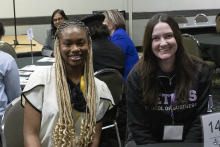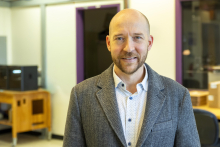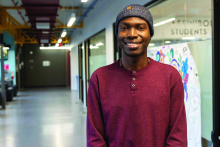Student Spotlight: Angela Chambers
October 31, 2016
We had the opportunity to sit down with second-year Culinary Arts student, Angela Chambers, to talk about the program and being a student.
Can you tell us a little about yourself?
My name is Angela Chambers. I’m a second-year student in the Culinary Arts program at Assiniboine Community College. I grew up in Brandon. I’m 39 years old and have three kids and a husband.
What made you decide to come to ACC? Why did you choose Culinary Arts?
Actually, just being at home with my family I started to do a lot of home baking and cooking. I really fell in love with it and it’s something that I really like to do. I had previously received a business degree from Brandon University but over the last few years I decided to change paths and pursue Culinary Arts.
Have you always been interested culinary arts?
I’ve always been interested in cooking and especially baking since I was in junior high and home economics classes. I never really looked at it as a career until I started doing more and more of it at home as I got older.
How has your experience been so far?
ACC has the Spend-A-Day program which is what I took part in before deciding to apply. As soon as I attended that I knew I wanted to come here. Most of our time is spent in the kitchen. During the first year of the program you spend some time in the classroom learning about the history and that kind of thing. Usually, we meet up in the morning and talk about what we’re going to do that day, go over the plans, and then the rest of the time is mainly spent in the kitchen.
Can you explain a little about the things you learn in the program?
Most of the lessons are split between hot kitchen and baking. In the hot kitchen we learn everything from working with and preparing vegetables to learning about different meats. Our days are built upon learning skills in both of those areas mainly. We might come in during the morning and do some baking and then go into the hot kitchen and prepare a soup and entrée and then plate them all together at the end of the day.
Everyone has to learn all of the lessons and be well rounded in all areas. We have some people that really take a liking to either the hot kitchen or baking but we learn it all. Our exams at the end of the year are based on both. What you learn in the bakeshop you can bring over to the hot kitchen and vice-versa, it makes you really well rounded in all aspects.
Has anything surprised you about the program?
I was surprised at how fast we had to learn and the pace of things. Especially when it came to our first event. Harvest on the Hill is one of the first events you have as a student and it still feels like you’re still so new. That was kind of overwhelming to think about at first but now that I look back at it I learned a lot by the entire process. That’s obviously the first time you do Harvest on the Hill, the second time you know what to expect. The second year is a bit different, though we have a lot more say on the menu items and planning. The second-year students really take a lead role and help the first-year students prepare.
I was shocked when they put me on the Grey Owl Restaurant line last year as a first-year student. I’m not someone that is overly outgoing or likes being put in stressful situations. I got put on the line last year to help do sauces one night for the event when one of the second-years became ill. I loved it. The term “on the line” means cooking. Everyone is split into different areas working the steamer, grill, oven, making sauces, or other jobs. It’s usually just the second-year students that get to do that stuff, at least at the start, so it was pretty awesome to take on position. I was initially helping prepare some of the ingredients for the event when different orders would come in. I was really surprised how I handled being thrown into a stressful situation last minute and kind of impressed myself.
First-year is mainly learning the basics so you can apply that to what you do in the second year. You start to do a few advanced and complex menu items as you go through the program and it all involves those basic skills you learn from the first-year.
Do you have any class projects you work on throughout the year?
I wouldn't call them projects, but we do some creative work such as salt moldings and celebration cakes; some of the fancier things.
What are your classmates and instructors like?
Awesome! We work pretty well as a team and for a lot of things we’re paired up with another student for a lot of the lessons throughout the year. The instructors are amazing and all have their own specialties. Chef Jo-Anne specializes in the bakeshop, Chef Bryan in the hot kitchen, and Chef Brad does a lot of great sugar work.
I understand the program involves many events throughout the year. What types of events do you host?
The first event we host during the year is Harvest on the Hill, which is a beer and food-pairing event. We have a large tent up by the sustainable greenhouse here at the North Hill Campus and have eight different stations set up, each with four food-pairings and eight beers. Our food items and menu are determined based on what beers the Hotel and Restaurant Management students have chosen to feature. A lot of the menu items are made with ingredients we help harvest ourselves when we come back to school in the fall. We create a lot of preserves from the apples we harvest and a lot of other things from the vegetables we processed.
The second event is the Holiday Buffet, which takes place at the end of November. It’s pretty cool to see everything set up. We literally have rooms dedicated to different things like salads, desserts, meats, anything you can think of.
In mid-January to mid-February we start our student-run, on-campus restaurant called The Grey Owl. It’s open for four weeks, Monday to Friday. It’s pretty crazy, we basically start up a restaurant and do everything from planning the menu, ordering ingredients, food costing—everything you’d encounter in a real restaurant. At the end of it, we even do inventory and breakdowns to see if we planned and priced everything correctly.
We also have the International Wine & Food Festival, which works similar to the Harvest on the Hill except we’re pairing our menu with different wines.
We also do some smaller events such as the Foundation Dinner. The Foundation Dinner is pretty fancy and, as students, we get to create a few menu items that really highlights what we have learned in the program.
What menu item for Harvest on the Hill did you contribute to the menu?
One of the menu items I had pitched for Harvest on the Hill was the carrot cake trifle. We had all desserts at my station. I believe it was chosen for 3rd place at the event.
Which is your favorite event to take part in?
There are things I love about them all. The one event that I had the most fun with last year was the Foundation Dinner because I was really impressed at how amazing you could make each plate look with them all being identical. It was fun to try some of the fancier things that you wouldn’t normally try day to day.
You were recently chosen to compete in a competition. Can you explain a little what it involves?
Myself and two other classmates are going to Toronto in November to compete in Taste Canada Cooks the Books. Culinary students are paired with a cookbook author and we are given one of the recipes from the book to prepare on stage and present. We’re being paired with Jean-Paul Grappe and we’ll create one of his duck ingredient recipes.
What is a typical test or exam like within the program?
Our exams are actually “Black Box Exams” where we’ll come in without knowing what ingredients we’ll have to work with. It’s up to us to use the ingredients and create a dish using them. It’s not my favorite part; I’d rather plan ahead.
Did you do anything to prepare yourself coming into the program? Do you have any advice for other people looking to take Culinary?
I did the Spend-A-Day program, which helped me get a look at what I was getting myself into. Other than that there isn’t much you can do to prepare yourself. Obviously, kitchen or restaurant experience helps but it isn’t necessary to start.
Definitely, try out the Spend-A-Day program. You get to come spend a full day with us in the kitchen and see what it’s like to be an actual student in the program. You get to see the environment and get a feel for everything.
Do you have any plans for after graduation?
I’m still trying to figure that out with where I’m at in my life. I really enjoy working in the bakeshop so if there were a way I could do that I’d definitely want to. I love making breads and cakes.
Thank you for taking the time to chat with us, Angela. Good luck at your competition in November!
Thank you!



